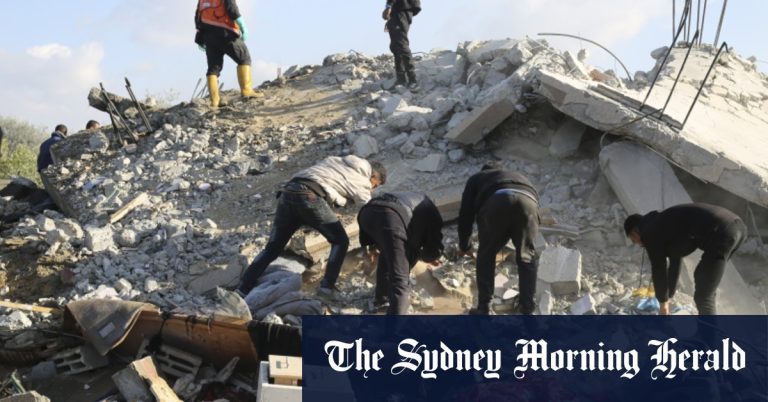The army identified the two people as Fernando Simon Marman (60 years old) and Luis Harr (70 years old), and said that they were in good medical condition. It said that Hamas activists kidnapped the two men from Kibbutz Nir Yitzhak in the cross-border attack on October 7 that led to the start of the war between Israel and Hamas, which has now entered its fifth month. They are just the second and third hostages to be safely rescued.
Lieutenant Colonel Richard Hecht said the operation was based on “accurate intelligence” and that the site on the second floor of the building had been under surveillance “for some time”. He said that Netanyahu joined the Israeli army commander and other senior officials as the raid took place.

Palestinians look at the devastation caused by an Israeli air strike on Rafah in the Gaza Strip on Saturday.credit: AP
Israel indicates that its ground attack in Gaza may soon target the densely populated city located on the Egyptian border. The White House said on Sunday that President Joe Biden warned Prime Minister Benjamin Netanyahu that Israel should not conduct a military operation against Hamas in Rafah without a “credible and implementable” plan to protect civilians.
Australian Foreign Minister Penny Wong said that Israel should “listen to its friends and the international community,” adding that there is a growing consensus on an immediate ceasefire on humanitarian grounds.
She added: “Many civilians who were displaced due to Israeli operations in the north moved south to this area, often under Israeli direction.” “Israel must now exercise special care with regard to these civilians. Failure to do so would have serious consequences for these civilians and cause serious harm to Israel’s own interests.”
download
Palestinian health officials and residents said that two homes were bombed and that eight Palestinians were killed and dozens of others were injured, according to Reuters, quoting the officials.
Biden's comments were his strongest language yet on the potential operation. Biden, who last week described Israel's military response in Gaza as “exaggerated,” sought “urgent and specific” steps to boost humanitarian aid. Israeli TV Channel 13 said the conversation lasted 45 minutes.
A senior administration official said discussion of the possibility of a ceasefire deal took up much of the call, and after weeks of diplomacy, an agreement that could lead to the release of the remaining hostages has now been “largely” framed. controlled by Hamas in exchange for a cessation of fighting.
The official, who spoke on condition of anonymity to discuss the negotiations, acknowledged gaps but declined to provide details. The official said that military pressure on Hamas in the southern city of Khan Yunis in recent weeks helped bring the movement closer to accepting the deal.
download
Netanyahu's office declined to comment on the call. The Hamas-affiliated Al-Aqsa TV channel had previously quoted an unnamed Hamas official as saying that any invasion of Rafah would “blow up” the talks mediated by the United States, Egypt and Qatar.
Biden and Netanyahu spoke after two Egyptian officials and a Western diplomat said Egypt had threatened to suspend its peace treaty with Israel if it sent troops to Rafah, as Egypt fears the fighting will push Palestinians into the Sinai Peninsula and force the closure of the main aid supply route to Gaza. .
More than half of Gaza's population of 2.3 million have fled to Rafah to escape the fighting in other areas, and refugees are congregating in camps and shelters run by the United Nations. Egypt fears the influx of large numbers of Palestinian refugees who may never be allowed to return.
Netanyahu said Fox News Sunday He said there was “a lot of space north of Rafah to go” after the Israeli offensive elsewhere in Gaza, and said Israel would direct evacuees “with leaflets, mobile phones, safe passages and other things.” But the attack caused widespread destruction, with people unable to be accommodated.
The confrontation between Israel and Egypt, two close allies of the United States, crystallized when aid organizations warned that an attack on Rafah would exacerbate the disastrous humanitarian situation in Gaza. About 80% of the population has fled their homes, and the United Nations says that a quarter of the population faces famine.
The ground operation in Rafah could cut off one of the few routes for delivering food and medical supplies. Wael Abu Omar, spokesman for the Palestinian Crossings Authority, said that 44 aid trucks entered Gaza on Sunday. About 500 people entered every day before the war.
Where will civilians go?
Qatar, Saudi Arabia and other countries also warned of dire consequences if Israel entered Rafah.
“The Israeli attack on Rafah will lead to an unspeakable humanitarian catastrophe and serious tensions with Egypt,” Josep Borrell, the European Union’s foreign policy chief, wrote on the X website. Human Rights Watch said that forced displacement is a war crime.
Egyptian officials fear that if the border is breached, the army will not be able to stop a wave of people fleeing to the Sinai Peninsula.
The United Nations says Rafah, normally inhabited by fewer than 300,000 people, now hosts 1.4 million more and is “extremely overcrowded.”
In Rafah, some displaced people packed their belongings again. Raafat and Fida Abu Haloub, who had fled Beit Lahia in the north earlier in the war, loaded their belongings onto a truck. “We don’t know where we can take him safely,” Fidaa said of their child. “Every month we have to move.”
Umm Muhammad Al-Ghamri, a displaced woman from Nuseirat, said she hopes Egypt will not allow Israel to force Palestinians to flee to Sinai “because we don’t want to leave.”

